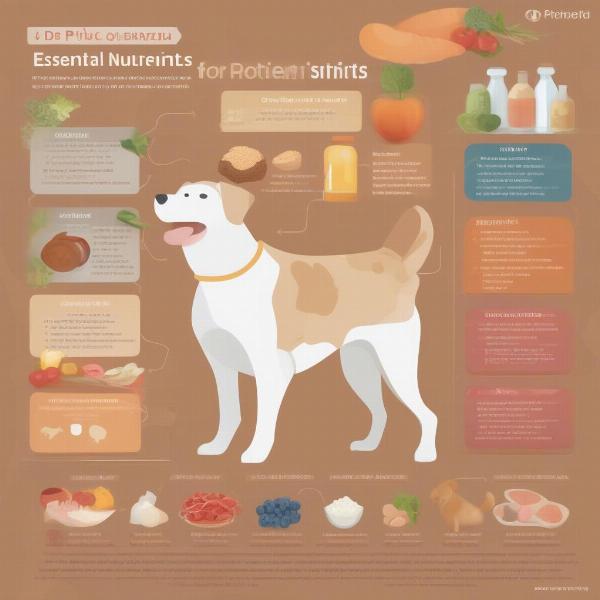Prenatal pills for dogs are a topic that often generates questions and confusion among dog owners. While ensuring a healthy pregnancy and robust puppies is a top priority for breeders and expectant dog parents, the idea of specific “prenatal pills” for dogs requires clarification. This article will explore the nutritional needs of pregnant dogs, debunk common myths about prenatal supplements, and offer evidence-based advice on providing optimal care for your pregnant canine companion.
Understanding a Pregnant Dog’s Nutritional Needs
A pregnant dog’s nutritional requirements increase significantly, especially during the final third of gestation. This is when the puppies are undergoing rapid growth and development. Meeting these increased needs is crucial for the health of the mother and the successful development of the puppies. However, this doesn’t necessarily translate to the need for specialized “prenatal pills.”
A high-quality, complete and balanced dog food formulated for all life stages often provides sufficient nutrients for pregnancy. Look for foods that meet the Association of American Feed Control Officials (AAFCO) standards. These standards ensure the food contains the correct balance of proteins, fats, carbohydrates, vitamins, and minerals.
Debunking the Myth of Prenatal Pills for Dogs
While some supplements marketed as “prenatal pills” for dogs exist, there’s no scientific evidence to suggest they are essential or superior to a well-balanced diet. Many veterinarians recommend focusing on providing a nutritious diet rather than relying on supplements. Over-supplementation can potentially harm the mother and puppies.
Always consult your veterinarian before adding any supplements to your pregnant dog’s diet. They can assess your dog’s individual needs and recommend the appropriate course of action.
Essential Nutrients During Pregnancy
While specific prenatal pills might not be necessary, certain nutrients are crucial during canine pregnancy. These include:
- Protein: Essential for building and repairing tissues, especially for fetal growth.
- Calcium and Phosphorus: Crucial for bone development in the puppies.
- Fatty Acids (DHA and EPA): Support brain and eye development in the puppies.
- Folic Acid: Important for cell division and growth, preventing neural tube defects.
 Dog Pregnancy Nutrition
Dog Pregnancy Nutrition
When Supplements Might Be Considered
In certain circumstances, your veterinarian may recommend specific supplements. These situations may include:
- Dietary Deficiencies: If your dog’s diet is lacking in essential nutrients.
- Large Litters: The increased demands of a large litter may require supplemental support.
- Underlying Health Conditions: Certain medical conditions may necessitate supplementation.
Your veterinarian can perform blood tests to assess your dog’s nutritional status and recommend appropriate supplements if necessary. Never administer human prenatal vitamins to your dog, as they may contain toxic levels of certain vitamins and minerals.
Feeding Guidelines for Pregnant Dogs
- Gradual Increase: Gradually increase food intake as the pregnancy progresses, especially in the final trimester.
- Multiple Small Meals: Feed several small meals throughout the day to prevent digestive upset and ensure consistent nutrient absorption.
- High-Quality Food: Choose a high-quality, AAFCO-approved dog food formulated for all life stages or growth.
- Fresh Water: Ensure access to fresh, clean water at all times.
Conclusion
Providing optimal nutrition for your pregnant dog is vital for the health of both the mother and her puppies. While marketed “prenatal pills for dogs” may seem appealing, a well-balanced, high-quality diet is typically sufficient. Consult your veterinarian for personalized advice and to determine if any specific supplements are necessary for your dog’s individual needs. A healthy pregnancy and thriving puppies are achievable through proper nutrition and attentive care.
FAQ
- Do I need special prenatal pills for my pregnant dog? Not necessarily. A high-quality diet is often sufficient. Consult your veterinarian for personalized advice.
- What should I feed my pregnant dog? A high-quality, AAFCO-approved dog food formulated for all life stages or growth.
- Can I give my dog human prenatal vitamins? No, never give your dog human prenatal vitamins. They can be toxic.
- When should I increase my dog’s food intake during pregnancy? Gradually increase food intake as the pregnancy progresses, especially during the final trimester.
- How often should I feed my pregnant dog? Feed several small meals throughout the day.
- What are some essential nutrients for pregnant dogs? Protein, calcium, phosphorus, fatty acids (DHA and EPA), and folic acid.
- What are the signs of nutritional deficiency in a pregnant dog? Consult your veterinarian if you notice any changes in your dog’s appetite, weight, coat condition, or energy levels.
ILM Dog is your trusted source for expert advice on dog care and breeding. We offer a wealth of information on dog breeds, health, training, nutrition, grooming, and much more. From puppyhood to senior years, we provide practical tips and guidance to help you give your furry friend the best possible care. For personalized advice and support, contact us at [email protected] or call us at +44 20-3965-8624. Visit ILM Dog for more information on all aspects of dog care.